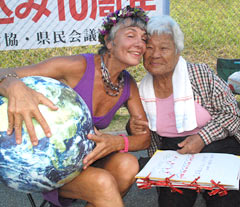Oceanographer claims Oura Bay is a world treasure

Oceanographer Katherine Muzik (left)spoke with Henoko resident Ayako Shimabukuro (right) at the tent located in front of the Camp Schwab gate in the Henoko district of Nago on September 22.
September 23, 2014 Ryukyu Shimpo
Oceanographer Katherine Muzik, who is researching coral reefs all around the world, visited the protest tent located in front of the gate of Camp Schwab in the Henoko district of Nago on September 22. Sit-in members protesting against the building of a new base, which would replace U.S. Marine Corps Air Station Futenma, were gathered at the tent. Muzik said that Oura Bay was a world treasure, having the richest coral reefs in the Pacific Ocean. She declared Okinawan people’s protest movement a success, pointing to the growth of support all around the world.
Muzik spoke in the endangered Okinawan language, Shimakutuba, about how the destruction of mountains would lead to the destruction of the sea, and the destruction of the sea would lead to the destruction of Okinawa.
While living in Okinawa for 11 years in the 1980s and 2000s, Muzik called for the protection of the coral reefs at Shiraho in Ishigaki Island where the Okinawa Prefectural Government had planned to build a new airport. This February, she wrote a letter to U.S. Ambassador Japan Caroline Kennedy, inviting the ambassador to dive with her in Oura Bay. Muzik was invited to visit Okinawa to take part in a symposium which was held in Nago on September 26.
Muzik, formerly a professor at Harvard University, has surveyed coral reefs in more than 30 locations around the world. She stressed that coral reefs were becoming extinct in various areas all over the world such as the Caribbean Sea, due to rising global temperatures, water pollution by red soil erosion and acidification. She added that she could not believe the U.S. and Japanese governments were intentionally destroying coral reefs for the sake of building the new military base.
Muzik said Oura Bay was a complete ecosystem, connecting smaller ecosystems in mountains, rivers and mangroves. She suggested that building an ocean reserve rather than the military base would contribute to employment and education.
According to Muzik, Okinawan people are faced with a choice between destruction and harmony. Like Scotland, she said, Okinawa’s democracy is taking root.
(English translation by T&CT)
Previous Article:Autumnal Equinox Day in Okinawa
Next Article:610 people take part in a prefectural convention for promoting Shimakutuba
[Similar Articles]
- Oceanographer Muzik confirms the importance of Henoko Coast
- Valuable coral from construction site crushed into pieces and anchored at transplantation site
- Coral spawning confirmed at Oura Bay
- Coral reefs in Oura Bay recovering from El Nino
- Coral community in Oura Bay damaged
 Webcam(Kokusai Street)
Webcam(Kokusai Street)


